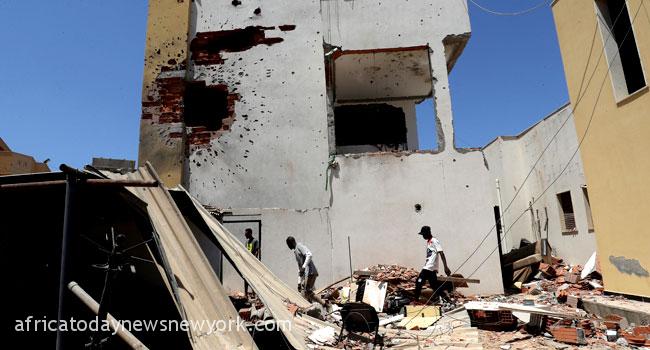No fewer than 16 people were on Saturday killed and 52 wounded as fighting between armed groups in Tripoli to a more violent turn, according to the health ministry, the clash is coming as the latest politically driven violence to hit the Libyan capital.
Fighting broke out on Thursday night and continued into Friday. Violence broke out in Misrata, Libya’s third city, on Saturday, forcing the US embassy to issue a warning about the possibility of a bigger flare-up.
Both of the competing prime ministers trying to lead what is left of a central government are from Misrata.
A militia allied with Prime Minister Abdulhamid Dbeibah’s unity government clashed with one allied with Fathi Bashagha, a contender named by the country’s eastern-based parliament in February.
US ambassador Richard Norland called on all political actors and their supporters among armed groups to stand down in order to avoid escalation.
Read Also: Angry Libyan Protesters Set Parliament Building Ablaze
‘Today’s clashes in Misrata demonstrate the dangerous prospect that the recent violence will escalate,’ he warned in a tweet.
‘Armed efforts either to test or to defend the political status quo risk bringing Libya back to an era its citizens thought had been left behind.’
The Tripoli clashes were between two armed groups with major clout in the west of the war-torn country: the Al-Radaa force and the Tripoli Revolutionaries Brigade.
Several sources said one group’s detention of a fighter belonging to the other had sparked the fighting, which extended to several districts of the capital.
Africa Today News, New York gathered that on Friday, another group called the 444 Brigade intervened to mediate a truce, deploying its own forces in a buffer zone before they too came under heavy fire.
Libya has been gripped by insecurity since a NATO-backed uprising toppled and killed dictator Moamer Kadhafi in 2011, leaving a power vacuum armed groups have been wrangling for years to fill.
Tensions have been rising for months in Libya as the rival prime ministers face off, raising fears of renewed conflict two years after a landmark truce ended a ruinous attempt by eastern military chief Khalifa Haftar to seize Tripoli by force.
The dead were the first civilian casualties of fighting in Tripoli since the 2020 truce.
Both groups involved in the Tripoli fighting are nominally loyal to Dbeibah’s Government of National Unity, appointed last year as part of a United Nations-backed peace process.
Dbeibah has refused to cede power to Bashagha, named prime minister after he made a pact with Haftar.
